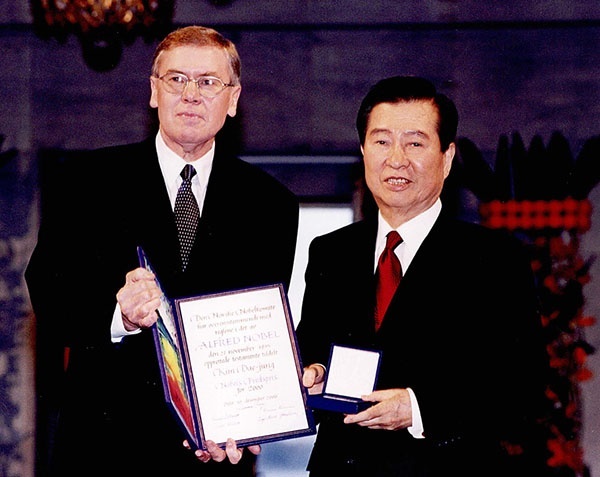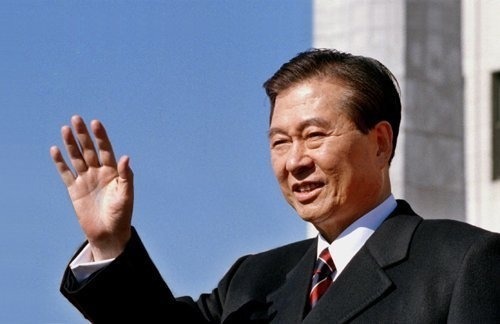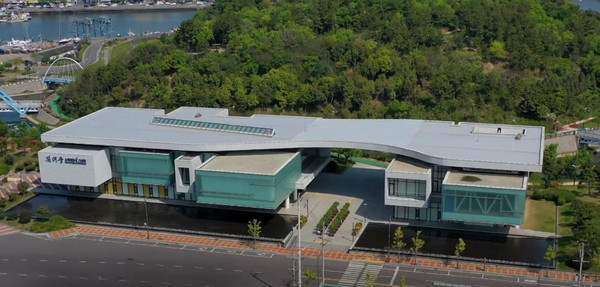
The Nobel Prize, considered the most prestigious award in the world, is announced every year on December 10th. 23 years ago, former President Kim Dae-jung became the first Korean to win the Nobel Prize. He was awarded the Nobel Peace Prize in recognition of his efforts for peace and democracy in East Asia. In this Korea Chronicle, let's learn more about Kim Dae-jung, the first and only Korean Nobel Prize winner.

Throughout his life, former President Kim Dae-jung consistently conveyed messages of human rights and peace. He initially entered the political world as a central member of a standing committee of the Democratic Party in 1956. Despite an unsuccessful presidential bid in 1971, where he competed against then-President Park Chung-hee and faced defeat, Kim Dae-jung persisted. As the Park regime continued its long-standing authoritarian rule[1], Kim Dae-jung shuttled between Japan and Korea, actively participating in the pro-democracy movement alongside other exiled pro-democracy activists. He not only championed Korea's democratization but also expressed a keen interest in improving relations with North Korea, passionately advocating for reunification. Fearing the threat posed by his active pro-democracy activities, the Park Chung-hee government went as far as ordering the abduction of Kim Dae-jung in Japan by agents of the Korean Central Intelligence Agency. Despite these challenges, he played a unifying role in the opposition to obstruct the undermining of democracy and military dictatorship. During the May 18th pro-democracy movement in 1980, he was arrested as a check on the coup d'état led by the Chun Doo-hwan military regime. Following the democratization of Korea, he faced two more presidential election defeats, losing to Roh Tae-woo and then to Kim Young-sam. Nevertheless, he persevered and eventually won the presidency in the 15th presidential election in 1998.

Kim Dae-jung's commitment to democracy, inter-Korean unification, and peace remained steadfast even after assuming the presidency. His administration of the Sunshine Policy increased exchanges between North and South Korea. He pursued reconciliation and engagement, approaching interactions with North Korea. Previously, South Korea had adopted the confrontational and hostile stance towards North, emphasizing anti-communism rhetoric to rally its citizens. In contrast, Kim Dae-jung sought ways to assist North Korea in its economic reform and opening to the global market, focusing on cooperation and reconciliation, and alleviating the tension that had built up between the two countries. Subsequently, private-sector tours to Mt. Geumgang began. In this context, the leaders of the two countries, in a historic turn of events, announced the June 15th, 2000, the North-South Joint Declaration, outlining the direction for discussions on reunification, based on trust and promise. As a result, they decided to establish the Kaesong Industrial Complex as a joint industrial zone to facilitate economic exchange between the two Koreas. This marked the first joint declaration between the two leaders since the division of the country. The easing of tensions between North and South Korea played a vital role not only in the peace of the Korean Peninsula but also in promoting peace throughout East Asia.
The Nobel Prize awarding institution recognized him as the winner of the 2000 Nobel Peace Prize in consideration of his lifelong efforts to realize democracy, his practical actions in the protection of human rights, and his leadership in bringing about the June 15th North-South Joint Declaration, eventually contributing to peace in Asia. During the Nobel Peace Prize ceremony on the international stage, he mentioned the Korean Peninsula issue, and drew global attention to the matter. He also appealed for the support of many nations in aiding North Korea's reform and eventual opening. To commemorate his Nobel Peace Prize award, the Kim Dae-jung Nobel Peace Prize Memorial was commemorated in Mokpo, his hometown.
Former President Kim Dae-jung was an activist and politician who acted according to his conscience amid Korean turbulent modern history. His numerous awards in the field of human rights, including the Nobel Peace Prize, serve as a testament to the significance of his actions. It demonstrates that he held fast to his convictions and tirelessly worked to create a better society, even in the face of adversity. Remember Kim Dae-jung's endeavors again, reflecting on the fact that the values we now take for granted were not always a given.
[1] Park Chung-hee maintained permanent rule based as a dictatorship, exercised control over the legislative and judicial branches to expand presidential authority and amended the Constitution to allow this. As a result, he held the presidency for 18 years.

